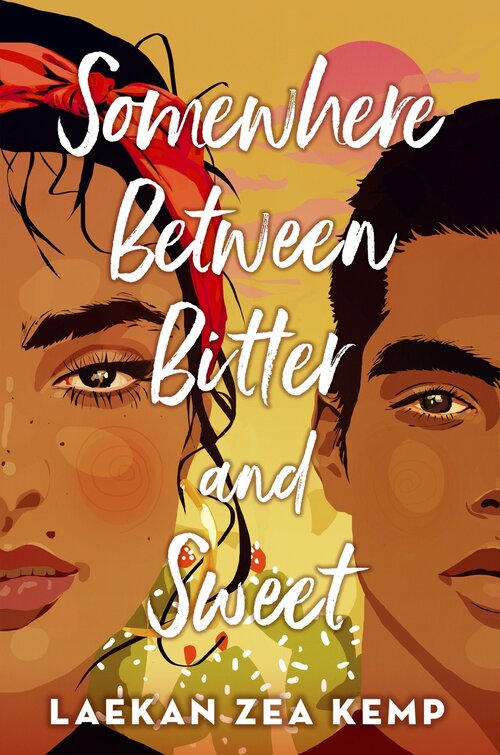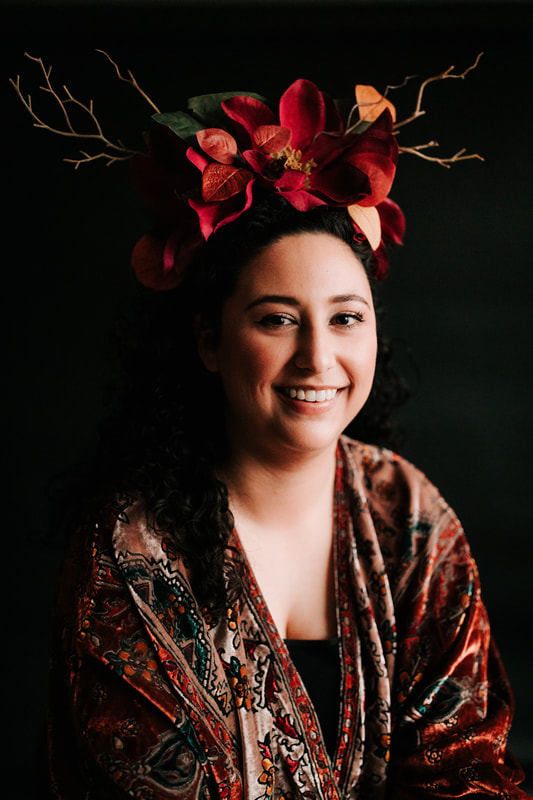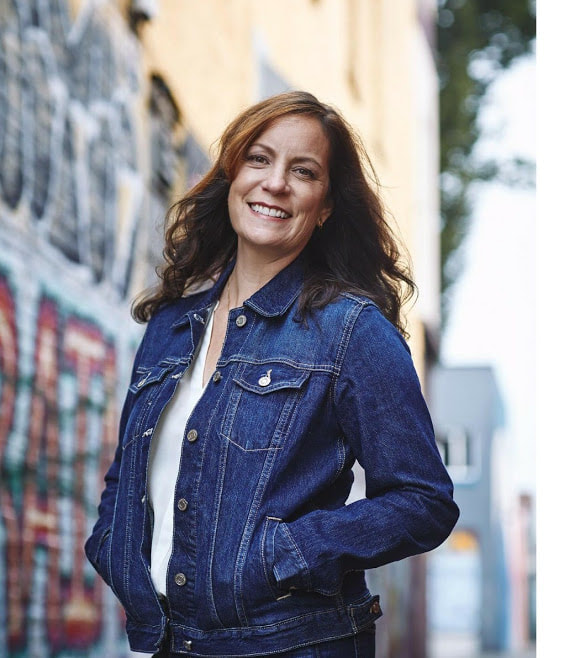|
VANESSA L. TORRES: Hi Laekan! First let me say, Happy Book Birthday to you for SOMEWHERE BETWEEN BITTER AND SWEET. How exciting! And thank you for taking the time to talk with me about this wonderful young adult debut. Let’s jump right in! Without giving away too much, I have to know what your experience is with food. Specifically, cooking and baking. This book was filled with so many colorful food scenes. I could actually taste and smell the ????? Laekan Zea Kemp: Expert eater, always have been! It’s how I celebrate. It’s how I find comfort. Food is such a powerful vehicle for emotions and I love that what we put on our plates can tell such a powerful story about who we are and where we come from. VLT: Having worked years in the food industry myself, I am aware the restaurant world is a culture in its own right. And you really captured what it’s like to be part of that. Are there any characters in the book who were inspired by the people in your real world? LZK: The setting of the restaurant is the thing I conceptualized first and it was inspired by the hilarious stories my partner would tell me about his many years working in a restaurant. So not only are there some secondary characters in the book who are based on real people but some of the shenanigans the restaurant employees get up to are also based on true events. VLT: Family is a big part of BITTER AND SWEET. I was so touched by Pen and Xander’s quest to find their footing as new adults and where they fit in. They both came from such different places, but really, were searching for the same sense of belonging. My question is, do you think family will always play a part in your books? LZK: Family can mean so many things, and for Latinx teens, no influence is stronger. So readers can definitely continue to expect me to write about not just families but also the communities around those families. My books have big casts and not only does it allow me to highlight the many different experiences across the Latinx, and specifically Chicanx, diaspora, but it also allows me to honor the ways in which Latinx and BIPOC communities often come together in the face of hardship. VLT: Let’s talk about craft for a moment. SOMEWHERE BETWEEN BITTER AND SWEET is a dual point of view story, which I loved! Did you find it challenging to tap into two different voices? Did you write one, and then the other? Did you have to stick with one character per writing session? I must know! LZK: I have always been drawn to writing dual-POV, especially in romance. I just think it’s so much fun to be inside both character’s heads as they’re falling in love. Also, I feel like being able to switch POVs every other chapter helps me while drafting because I’m not getting bogged down in a single narrative. I tend to work in chronological order so that switching back and forth helps to keep things fresh. It also helps me a lot with pacing. If things are slowing down plot-wise with one character, I can just jump to the next and keep things moving. But the key to balancing multiple POVs and making sure they sound distinct is to figure out early on the lens through which each character sees the world and then filtering everything through that lens. This could be based on some false belief the character has or based on some sort of trauma they’ve experienced. But regardless of the source it should have an effect on their internal dialogue and self-talk, as well as their actions and reactions throughout the story. VLT: Okay, now that BITTER AND SWEET is almost out, what was the hardest part of the debut process? Were there any surprises? Anything you would do differently … or again? The trickiest thing has been having my identity commodified simply because I’m writing an #ownvoices story about my specific community. I’ve been surprised by some of the questions I’ve been asked and some of the assumptions people have made about me because of things that are included in the book. And I’m often having to engage in these conversations with news outlets that don’t necessarily take special care with how they write about marginalized communities in the first place. I was warned about it by other Latinx and BIPOC authors but, still, the first time you’re made to feel like some kind of exotic attraction is not fun. VLT: There are so many aspiring writers out there who will read your books. Any advice for them when it comes to staying focused during this unprecedented time? I have a podcast called Author Pep Talks where I interview other writers about this very topic. We talk about maintaining a creative practice through hardship and it came about because of the absolutely agonizing experience I had trying to draft my sophomore novel during the height of the pandemic. So my first bit of advice would be to go give those episodes a listen and my second bit of advice would be to let go of the expectations you had for yourself before the pandemic and create new ones that prioritize self-care and grace. This is a (hopefully) once in a lifetime experience we are all having. Just surviving day to day is good enough. Which leads me to my third and final bit of advice--write to heal. Once you get an agent, and especially once you get your first book deal, writing starts to feel more like a business. But your creative practice is so much more than just a means to a monetary end. Your creative practice should be what you turn to in times of stress and fear and grief. It should be the thing feeding you, holding you, and most importantly, healing you. So reach for that the next time you sit down to write. Not a specific word count goal or the bell at the end of a 60-minute timer. But that feeling you get when everything wrong and raw and hurting inside you is finally out and on the page. VLT: Las Musas has given me a sense of belonging I never had before. I’m curious about why and when you joined Las Musas, and what this wonderful group of Latinx writers brings to you personally, and as a debut author? LZK: On just a personal level, I have spent a lot of my post-college years really craving female friendships. But developing and maintaining those kinds of relationships isn’t always easy, especially because I’ve lived in four different cities over the past ten years. So the friendships I’ve made through Las Musas have had a really profound impact on me. And then, of course, you have the mission of the collective to increase Latinx representation in Kidlit and to amplify Latinx Kidlit authors and illustrators, and it feels really meaningful to be working towards that together. It’s not an easy problem to try to solve and while we are working together to try to create this positive systemic change we’re also still dealing with this broken and harmful system on a personal level. Whether we’re out on submission with a new project, or working on revisions with an editor, or promoting our work in a digital space, there is always the potential for there to be implicit bias and racism. So it takes a toll, which is why I think the fact that it’s a community effort is so important. It makes the work more sustainable and that’s really the only way we’re going to be able to make a substantial impact. And that’s what’s missing from publishing right now. There’s a lot of performative allyship going on and superficial changes being made that are easy to highlight in a social media post. But achieving true equity is not something that can be fixed from a surface-level. It’s like trying to slap a new coat of paint on something when what you really need to do is tear it down. Which is exactly why no one wants to do it. Because why dismantle a system that affords you so much privilege? So I look on these quote-unquote allies with a lot of skepticism and instead of putting too much stock into whatever they’re promising marginalized authors, I try to use my own privilege, as someone with a traditional publishing deal, as a member of Las Musas, and as a light-skinned Latina to share what I know and what I’ve learned with as many people as possible. The teacher in me just wants to break down those informational barriers that keep so many marginalized authors out of traditional publishing, as well as to shine a spotlight on as many up and coming Latinx writers as I can. Because, as is also made clear in Somewhere Between Bitter and Sweet, our community has to stick together and take care of each other because no one else is going to do it. So I feel like that’s what Las Musas is really about. It’s just an extension of what the community is already so used to doing and being for each other. A helping hand when you need it. Someone to fight alongside you. A place to be fed, mind, body, and spirit so that you can tell the stories you long to tell. So that someday kids will have access to those stories and that community work will come full circle. VLT: Now for the off-duty stuff. Because writing a book is HARD. What do you do to get away from it all? When you need to take a break, what does your day look like? LZK: So this might make me sound really sad and pathetic but I am actually just now in the process of figuring that out. For the last ten years, every minute that I wasn’t working, I was writing. Even after I got my book deal for my debut novel, I was juggling all of that with teaching. So I have really put all of my extra time (well, what little extra time I had because teaching is a super demanding job) towards pursuing this dream. It wasn’t the healthy way to do things but as an over-functioner I really didn’t know any other way. Luckily with age and experience, I’ve developed some more perspective on this, and in fact, have designated this year as the year that I will learn to rest. I decided not to return to my teaching job this past fall, mostly due to the pandemic, and since then I’ve been working really hard on breaking those bad habits of overworking. So I’m just now in the process of figuring out what I enjoy outside of that. I spend a lot of time with my dogs. We got a new puppy in November, which was totally unexpected, but also the best decision we could have made. I love being outside in nature. But I also love the flipside of that and decorating my home and making it nice and cozy. I also really enjoy cooking, which is probably obvious since my book focuses a lot on food. Especially sweets. I have a big sweet tooth so just like randomly getting a milkshake with dinner or ordering cookies that look like my book cover--those are really the things bringing me joy right now. VLT: I get asked this a lot, as I’m sure a lot of authors do. But, did you always want to be a writer? LZK: I’ve wanted to be a writer, probably since middle school. Though I didn’t really know how one might go about pursuing a career like that. I read all of the time but knew nothing about how books were made or even all of the other people involved in the process. And even when I went to college and decided to major in Creative Writing, I don’t remember being given any information about publishing as a business or even how to get an agent. It was all focused on workshop and the only opportunities for publication that were really discussed were submitting to literary journals and anthologies and things like that. Commercial fiction had zero presence. It was like it didn’t exist. So it took another, almost ten years after that, for me to learn on my own about the publishing industry and genre fiction and Kid lit specifically. But once I’d found the Kidlit community I was like, okay these are my people, and I knew that was where my work belonged. VLT: So, what’s next for Laekan Zea Kemp? LZK: My sophomore novel is another Young Adult Contemporary Romance, also told in dual-POV. This time it focuses on two musicians who have terrible stage fright, which keeps ruining their plans of auditioning for the music school of their dreams. They’ve also both experienced the death of a parent, which feeds into the fears they have about failure and rejection. So it’s a story about grief and about the healing power of art, especially music. And it actually takes place in the same neighborhood as Somewhere Between Bitter and Sweet so in addition to watching these two characters go through this painful but also hopeful journey of self-discovery and self-acceptance, we also get to see how the neighborhood as a whole is continuing to deal with gentrification and police brutality and other very BIPOC-specific experiences of trauma. But even though it explores some dark topics, just like with Somewhere Between Bitter and Sweet, this story is infused with a lot of hope, which is something I really try to emphasize. I never want to dump a bunch of really heavy stuff on readers, particularly young readers, with no light at the end of the tunnel. So there’s a big climactic scene near the end of the book that feels very reminiscent of the block party scene in Somewhere Between Bitter and Sweet, though it’s not quite a party. But, there are lots of similarities between the two books. I consider them more companion novels. So if people enjoyed Somewhere Between Bitter and Sweet I definitely think they’ll enjoy my next book too. Also, I have seen the cover and it’s STUNNING! Buy SOMEWHERE BETWEEN BITTER AND SWEET today!
1 Comment
Jerry Donnelly
4/9/2021 02:13:34 pm
Great interview Vanessa
Reply
Leave a Reply. |
Las Musas SpeakWelcome to our blog! Archives
July 2024
Categories
All
|




 RSS Feed
RSS Feed